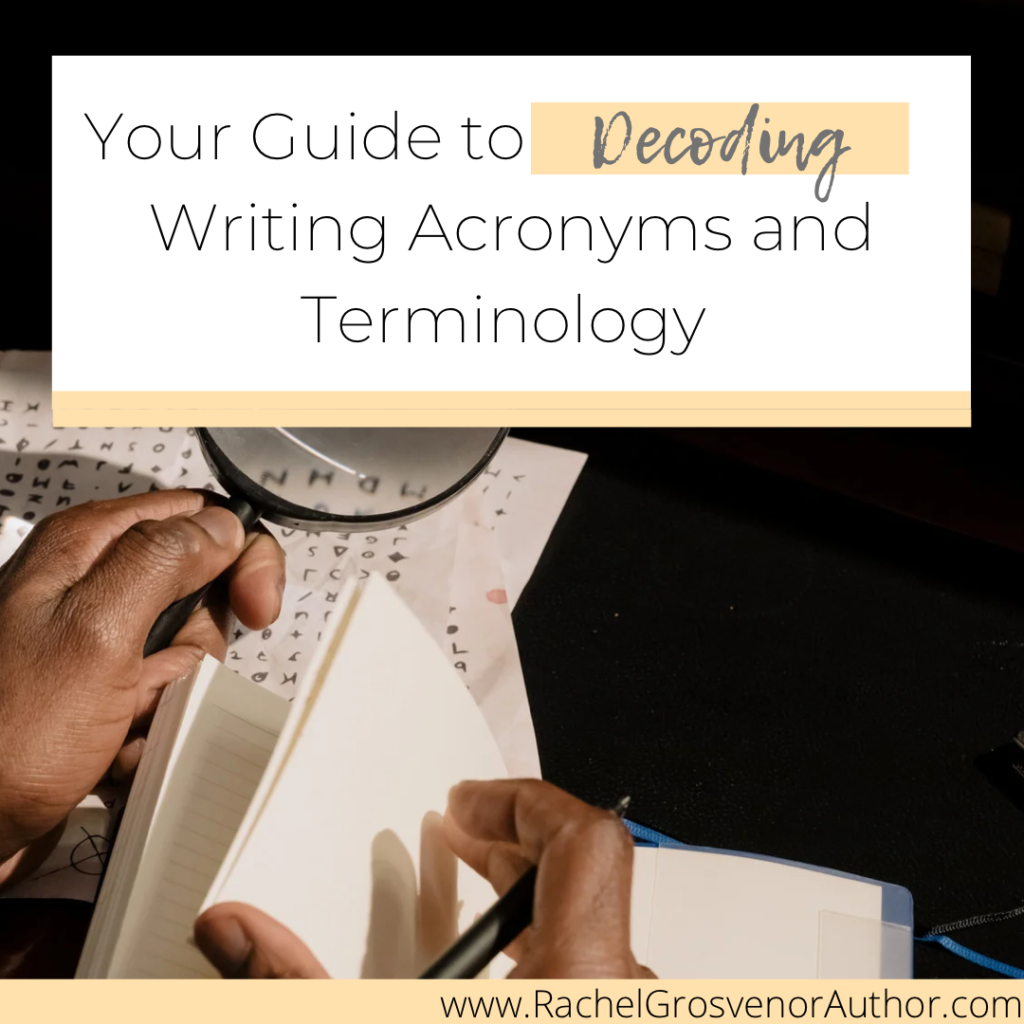Have you ever been online and seen a writing post that you don’t understand? I have been there.
Despite having studied Creative Writing at university, I was slightly baffled by the writing acronyms and terminology used when joining the online world of writers. What on earth was a CP, anyway? So, if you have ever felt this way, too, here is a helpful guide to de-code that confusing language for you!
- Active voice – Using the subject of a sentence to perform an action, “The monkey likes bananas” rather than “The bananas were liked by the monkey.”
- Alpha reader – Someone who reads your draft as you are writing it. Alpha readers are often writers and can give you insight into fixing an issue.
- Amplification – Adding to a sentence to build upon its meaning.
- Analogy – “The mind is like a car engine.” – Drawing a comparison between two things that are not alike to help make a point.
- Antagonist – The villain of your story.
- Anti-hero: A flawed hero, such as Batman.
- Beta reader – Someone who reads your novel once it has been through at least one draft. A beta reader aims to give you a reader’s perspective. They do not have to be a writer, as they are reading as your ‘target audience’.
- Blurb – A short description of a book designed to engage a reader.
- CP – Critique Partner
- CW – Creative Writing
- Character arc – Your character’s personal journey and how they develop.
- Colloquialism – Slang, ordinary conversation. This can make dialogue seem more realistic.
- Copy editing – Editing for grammar, spelling, punctuation and style.
- Developmental editing – Editing for narrative, characterisation, plot, and more.
- Dialogue tags – A verb post dialogue to show who has spoken, e.g.: ‘yelled Sally.’
- Exposition – providing background information to help the reader understand what is happening.
- External conflict – The issues facing a character externally, for example; A character losing their job.
- First-person – I language. ‘I went to the shops.’
- Foreshadowing – To write an indication of an event or moment.
- Fourth person – One language. ‘One goes to the shops.’ (Not often used in narrative)
- Grammatical person – First, second, third or fourth person narrative.
- Head-hopping – moving from one character’s point of view to another within the same writing section.
- Information dump: A lot of backstory or information given at one time. This can be jarring and might pull a reader out of a story.
- Internal conflict – How a character is coping internally, within themselves.
- MS: Manuscript, an unpublished piece of work.
- NANOWRIMO – National Novel Writing Month, which takes place during November.
- Narrative break – A break in the story to signal to the reader that there has been a passage of time.
- OC – Original character.
- POV – Point of view. The person from whose perspective you are telling a story.
- Pantser – Someone who doesn’t plot a novel but prefers to invent as they write.
- Planster – Someone who both plans and creates on the spot when writing.
- Plot hole – An issue with a plot that makes it seem unrealistic or creates an inconsistency.
- Plotter – Someone who plans a story in advance.
- Protagonist – Your main character.
- Red herring – To give a false clue to your reader.
- Second person – You language. ‘You went to the shops.’
- Subplot – a storyline that moves alongside the main plot, often supporting it.
- Synopsis – A summary of your story.
- Third-person – He, she, they language. ‘They went to the shops.’
- WIP – Work in progress.
- Writing sprint – A timed session where one writes as much as possible.
Are there any writing acronyms and terminology I have missed out that you want to know about? Let me know, and I’ll add it!











